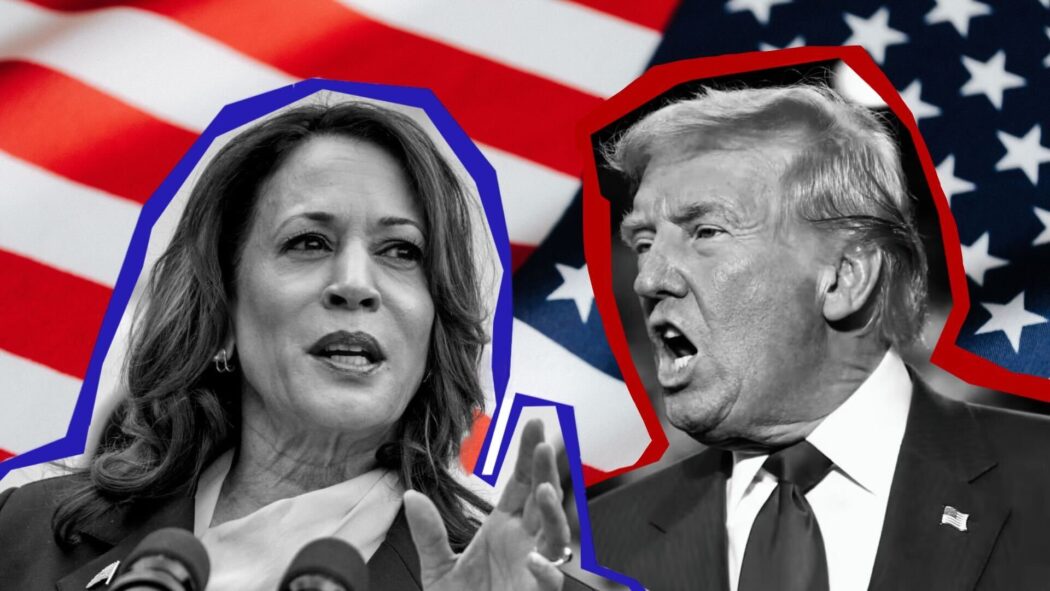With the 2024 U.S. elections fast approaching, the world holds its breath, awaiting the outcome that could significantly reshape America’s future and its role as a dominant world power. For decades, the United States has exercised unparalleled influence in the Middle East, often dictating regional politics, alliances, and conflicts through economic, military, and diplomatic means. With candidates as ideologically distinct as Kamala Harris and Donald Trump, the next president will wield enormous power in defining U.S. foreign policy, particularly in a region perpetually on the verge of conflict.
U.S. Politics Under Different Leaderships
The stark contrast between Kamala Harris’s and Donald Trump’s approaches to the Middle East offers insight into the potential policy directions under each administration. Both candidates have presented distinct foreign policy strategies, and their handling of the complex relationships between Israel, Palestine, Iran, and Lebanon could determine the future of U.S. influence in the region.
If Trump Wins:
In a second Trump presidency, Trump would likely build on his previous hardline approach to the Middle East. During his first term, Trump’s administration pulled the U.S. out of the Iran nuclear deal, offered unequivocal support to Israel, and took a confrontational stance toward Iran and Hezbollah in Lebanon. Favouring military solutions and economic sanctions, his policies repeatedly sidelined diplomatic channels. If re-elected, Trump would likely double down on these tactics and offer increased military aid to Israel, thus solidifying ties with the Netanyahu government. Such a move would presumably embolden hardline factions within Israel while exacerbating tensions with Palestine. The Trump administration’s previous measures–such as recognizing Jerusalem as Israel’s capital and endorsing West Bank settlements–made the prospect of a diplomatic solution to the Israeli-Palestinian conflict increasingly remote. A second Trump term would likely continue along this path, marginalizing efforts for negotiation and peacebuilding.
On the Iran front, Trump’s “maximum pressure” campaign—which focused on sanctions and military threats—strained relations with Tehran and increased tensions across the Gulf. A continuation of this policy could result in heightened conflict with Iran, further destabilizing Lebanon, where Hezbollah, Iran’s proxy, wields significant power. Increased U.S. pressure on Hezbollah could risk plunging Lebanon deeper into crisis, compounding an already fragile political and economic situation.
If Harris Wins:
Kamala Harris, in contrast, is known for her commitment to multilateral diplomacy and measured approaches to conflict resolution. She demonstrated this during the Israel-Palestine conflict by advocating for U.S. coordination with the UN, Egypt, and Jordan to de-escalate the 2021 Gaza violence. She emphasized a two-state solution and supported humanitarian aid for Palestinians, highlighting diplomacy as key to achieving long-term stability. While a Harris administration would still prioritize American interests, it may pursue a more balanced Middle East policy. Harris has expressed support for engaging with Iran diplomatically, which could lead to re-evaluating sanctions and potentially reopening discussions on the nuclear deal. This shift would ease tensions in the Gulf and open the door for more stable relations between Iran and the West.
That being said, Kamala Harris’s views on the Israel-Palestine conflict have sparked controversy, particularly among progressives and pro-Palestinian advocates. Her consistent support for military aid to Israel, including a $735 million arms sale during the 2021 Gaza conflict, has drawn criticism from those who believe an arms embargo is necessary to pressure Israel on human rights issues. While Harris advocates for a two-state solution and has called for protection of Palestinian rights, her reluctance to support an arms embargo or stronger conditions on U.S. aid has raised questions about her practical commitment to balanced diplomacy in the region. These positions have impacted her popularity among voters, prioritizing a more critical approach to U.S.-Israel relations and posing challenges to her election prospects.
Ultimately, Harris is still expected to take a more nuanced approach to the Israeli-Palestinian conflict, balancing the need for Israel’s security with a renewed commitment to Palestinian rights. Although a two-state solution remains elusive, a Harris presidency could foster greater engagement between the two sides, prioritizing peace talks over unilateral action. Albeit the administration may face significant challenges in brokering any lasting agreement, Harris’s emphasis on diplomacy and human rights could lead to more constructive dialogue and a push for de-escalation in the region.
Broader Implications for the Global Hegemon:
Beyond the immediate effects on the Middle East, the 2024 U.S. elections have broader implications for global leadership in the region. Under Trump, the U.S. increased their isolationist policies; America-first foreign policy. This led to an administrative shift away from multilateralism and a focus on bilateral deals. His administration’s withdrawal from international agreements and reduction in foreign aid signalled a retreat from the U.S.’s traditional role as a global leader, allowing rivals such as China and Russia to expand their influence, particularly in regions like the Middle East.
A Trump victory would likely continue the trend of prioritizing U.S. interests over global coalition-building, focusing on unilateral actions that assert U.S. influence. Although this approach may sideline traditional alliances, the administration could still exercise significant coercive power through military investments and strategic support, such as weapons sales to Israel. This allows the U.S. to retain influence in key regions like the Middle East, even without extensive diplomatic engagement. However, it could open the door for other powers to expand their roles in areas where the U.S. is less actively building alliances.
A Harris victory could signal a shift back toward multilateralism, with the U.S. seeking to restore its leadership role through renewed partnerships with Middle Eastern and European allies. Harris would likely strengthen alliances and leverage diplomatic channels, fostering a more collaborative approach to complex global challenges such as security, trade, and climate change. While her administration might emphasize shared responsibility and coalition-building, balancing national interests with international cooperation would be key to managing nuanced regional issues, especially in areas where U.S. and allied priorities may not fully align.
The outcome of the 2024 U.S. elections will significantly shape the future of American foreign policy in the Middle East. Whether through Trump’s hardline policies or Harris’s more diplomatic approach, the U.S. will continue to play a pivotal role in the region. As Israel, Palestine, Iran, and Lebanon await the results, the ripple effects of this election will be felt for years to come, influencing both regional stability and global power dynamics.








